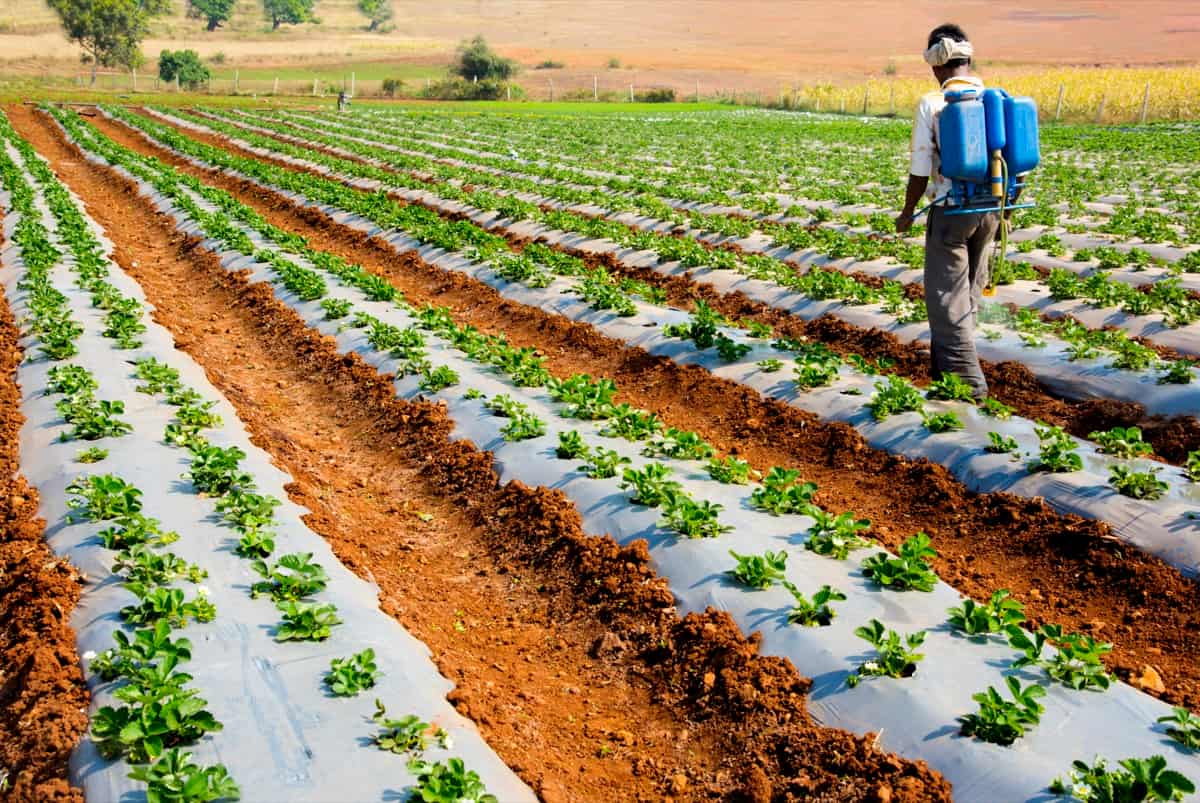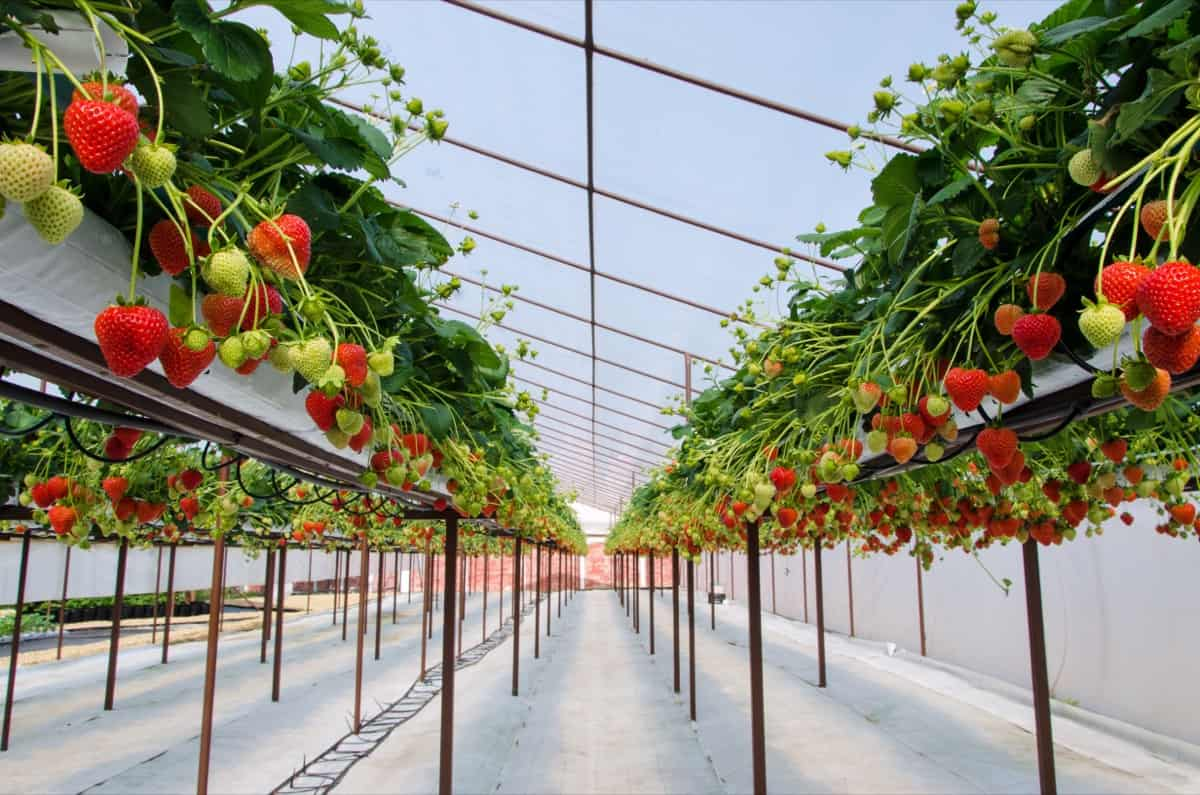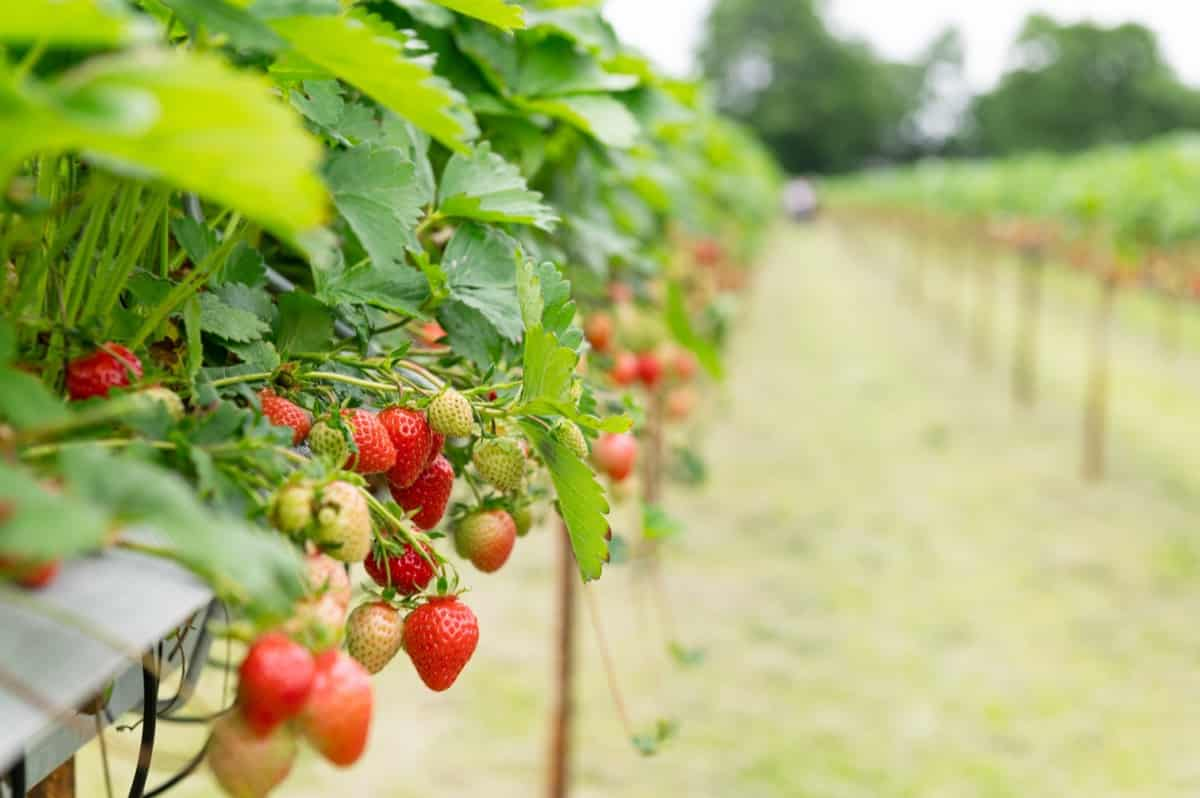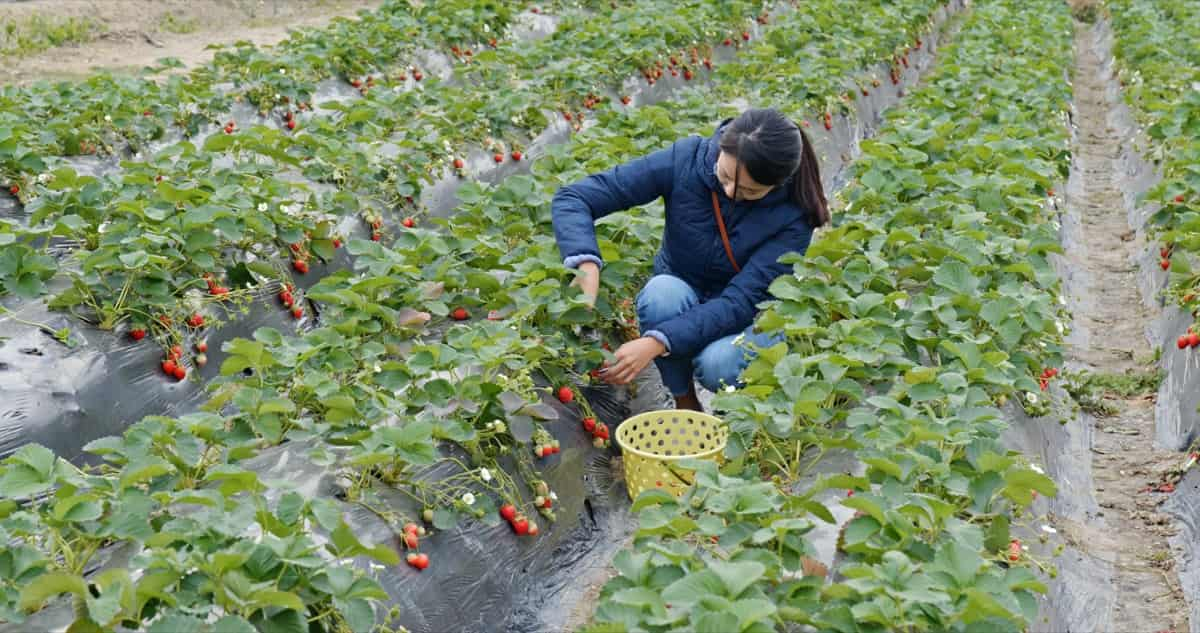Strawberry plants require specific nutrients to grow and produce optimal yields. Fertilizers provide plant nutrients, ensure healthy growth, strong root systems, and abundant fruit production. When it comes to Strawberry fertilizer requirements, nitrogen (N), phosphorus (P), and potassium (K) are the essential macronutrients needed for healthy plant growth.

Strawberry Fertilizer Requirements
Best Organic Fertilizer for Strawberries
The main organic fertilizer option is blood meal, which contains 13% nitrogen – an important nutrient for plant growth. It is a fast-acting fertilizer that can help boost productivity and overall yield. Another great choice is fish meal, soy meal, or alfalfa meal – all nitrogen-rich. A feather meal might be your best bet if you’re looking for a slow-release option. A nitrogen content of 15% provides a steady supply of nutrients over time.
This can be especially beneficial for long-term Strawberry production. Remember that choosing the right organic fertilizer for Strawberries depends on your needs and soil conditions. Selecting the best organic fertilizer for your Strawberries will ensure optimal growth and bountiful harvests while staying true to sustainable farming practices.
Strawberry Fertilizer Schedule
The best time to apply fertilizer to your Strawberry plants is early spring before new growth begins. This helps give them a boost of nutrients as they start their growing season. However, growing Strawberries in containers or raised beds can fertilize them in late winter or early fall. It’s important not to over-fertilize your Strawberries because this can lead to excessive vegetative growth. The important aspect of the Strawberry fertilizer schedule is to fertilize when the leaves first appear in spring.
This is a crucial time for plant development; providing them with a boost of nutrients can help promote healthy growth. Fertilizers for Strawberries come in both dry and liquid forms, allowing flexibility in choosing what works best for you and your gardening preferences. Whether you prefer using granular or liquid fertilizer, both options can be applied during either spring or fall.
Slow-Release Fertilizer for Strawberries
Slow-release fertilizers are a great option for providing long-term nourishment to Strawberry plants. These are designed to slowly release nutrients over an extended period, ensuring your Strawberries receive a steady supply of essential elements. One popular slow-release fertilizer for Strawberries is coated granular fertilizer. These tiny granules are coated with a special material that controls the release of nutrients based on temperature and moisture levels.
Another type of slow-release fertilizer is organic compost or manure. These natural sources of nutrients break down slowly in the soil, nourishing your Strawberry plants throughout their growth cycle. In addition to these advantages, slow-release fertilizers for Strawberries also save you time and effort by reducing the frequency of application.
Foliar Fertilizer for Strawberry Plants
Foliar fertilizers can be a great addition to your Strawberry plant care routine. These fertilizers are applied directly to the plant leaves, allowing quick and efficient nutrient absorption. They provide an extra boost of nutrients that can help improve overall plant health and increase fruit production. One advantage of using foliar fertilizer for Strawberries is its ability to supply essential micronutrients directly to the plants.
In case you missed it: Project Report of 1-Acre Strawberry Farming: Production Cost and Profit Analysis

Strawberry plants require various micronutrients such as iron, manganese, zinc, and copper for optimal growth and development. Foliar fertilizers containing these micronutrients can help prevent deficiencies and promote healthy foliage. Additionally, foliar fertilizers can aid in addressing nutrient imbalances or deficiencies that may arise during different stages of Strawberry growth.
NPK Fertilizer for Strawberry Plant Growth
Using a fertilizer with an 8-12-32 NPK ratio specifically designed for Strawberries gives your plants the nutrients they need at each growth cycle stage. Whether establishing roots or producing flowers and fruits, this balanced formula will ensure they have what it takes to thrive. Remember to follow recommended application rates when using any fertilizer on your Strawberry plants. Over-application can lead to nutrient imbalances or even burn the delicate roots. Always read product labels carefully before use.
Nitrogen Fertilizer for Strawberry Production
Nitrogen plays an important role in the Strawberry plant’s growth. It is an important nutrient that promotes healthy leaf and stem growth and vibrant fruit production. Ammonium nitrate contains a high concentration of nitrogen. This fertilizer immediately boosts plant growth and can be applied at various stages throughout the growing season. You can ensure robust growth and bountiful harvests by giving your Strawberry plants adequate nitrogen.
Phosphorus Deficiency in Strawberries
Phosphorus deficiency in Strawberries is a common issue that can greatly impact their growth and overall health. This essential nutrient is crucial in various physiological processes, including energy transfer, root development, and flower formation. One way to identify phosphorus deficiency in Strawberries is by observing the color of the leaves. In affected plants, the foliage may appear dark green or even purple-tinged. Additionally, you might notice older leaves turning yellow.
Providing Strawberries with an appropriate phosphorus fertilizer source is important to address this deficiency. One option is to use rock phosphate or bone meal as organic amendments when preparing the soil before planting. These slow-release fertilizers gradually release phosphorus over time to ensure long-term plant availability.
Calcium Nitrate Fertilizer for Strawberries
Calcium is an essential nutrient for Strawberry plants as it is crucial in their growth and development. One way to ensure an adequate supply of calcium is by using calcium nitrate fertilizer. This fertilizer provides nitrogen and calcium, vital for Strawberries’ overall health and productivity.
In case you missed it: How to Grow Wild/Alpine Strawberry: Planting to Harvest Guide

To apply calcium nitrate fertilizer effectively, mix it with water based on the manufacturer’s instructions and spray it evenly on the foliage or soil around the plants. It’s important to note that while calcium nitrate benefits Strawberries, excessive use can lead to imbalances in other nutrients.
Micronutrient Deficiencies in Strawberry Plants
It can significantly impact their growth and productivity. One micronutrient deficiency that Strawberries may encounter is iron deficiency. Yellowing leaves on Strawberries can identify this with green veins, known as interveinal chlorosis. To combat this issue, applying chelated iron fertilizers or foliar sprays containing iron can help replenish nutrient levels and promote healthy leaf development. Another important micronutrient for Strawberries is manganese.
Manganese deficiency manifests through pale green or white spots on young leaves, leading to stunted growth. Applying manganese sulfate to the soil around the plants or using foliar sprays can alleviate this problem and ensure proper plant development. Zinc deficiency is another concern for Strawberry growers. It often presents itself as distorted or small leaves with irregular coloring patterns. Adding zinc sulfate to the soil or utilizing foliar applications containing zinc can rectify this issue and promote optimal plant growth.
Organic vs. Synthetic Fertilizers for Strawberries
Organic fertilizers are derived from animal manure, compost, or plant materials. These organic fertilizers provide slow-release nutrients to the soil and improve its overall health and fertility. They also promote beneficial microbial activity in the soil, enhancing plant nutrient availability. Alternatively, synthetic fertilizers are manufactured using chemicals and minerals.
They provide an immediate boost of nutrients to plants but may negatively impact soil health in the long run if used excessively. One advantage of organic fertilizers is their ability to enhance soil structure and water-holding capacity over time. Moreover, organic fertilizers contribute to sustainable farming practices by reducing chemical inputs and promoting biodiversity in agricultural ecosystems.
Potassium Fertilizer Application in Strawberry Cultivation
Potassium is a vital nutrient for Strawberry plants, playing an important role in their growth and development. When applied as fertilizer, potassium helps to enhance the overall quality of Strawberries by improving their flavor, size, and color. It also strengthens the plants’ resistance against diseases, pests, and environmental stressors.
In case you missed it: 8 Common Problems with Garden-Grown Strawberries: How to Overcome Them

Potassium fertilizer should be applied at specific Strawberry cultivation stages to ensure optimal results. It’s equally crucial not to overdo it with potassium fertilization. Excessive amounts can lead to nutrient imbalances like nitrogen and phosphorus, hampering overall plant health.
Conclusion
To ensure the success of your Strawberry plants, it’s crucial to understand the soil type and their specific fertilizer requirements. In addition to NPK macronutrients, Strawberries benefit from micronutrients such as iron, manganese, zinc, copper, boron, and molybdenum. These trace elements play vital roles in various physiological processes within plants.
- Feed Your Flock for Less: Top 10 Tips to Save on Chicken Feed
- Ultimate Guide to Ossabaw Island Hog: Breeding, Raising, Diet, and Care
- Hatching Answers: The Top 10 Reasons Your Chickens Aren’t Laying Eggs
- Eggs and Economics: Breaking Down the Cost of Raising Backyard Chickens
- Defend Your Greens: Proven Methods to Keep Iguanas Out of Your Garden
- Ultimate Guide to Cinnamon Queen Chicken: A Comprehensive Guide for Beginners
- Ultimate Guide to California Tan Chicken: Breeding, Raising, Diet, Egg-Production and Care
- Ultimate Guide to Marsh Daisy Chicken: Breeding, Raising, Diet, and Care
- 10 Types of Chicken Farming Businesses You Can Start for Profits